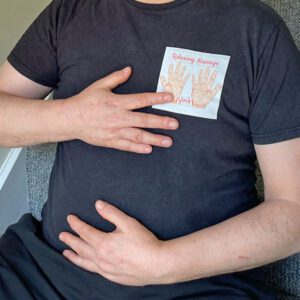5 Effective Breathing Techniques for Stress Management
 Stress is a natural part of life and managing it in healthy ways can be essential for keeping our mental wellbeing and physical health in check. Fortunately, there are a variety of breathing techniques for stress management that can help us stay calm and relaxed in the many challenging situations life offers us. Using our breath can manage stress by simple taking a moment to calm ourselves down. These five breathing techniques demonstrate this: Box Breathing, Mindful Breathing, 4-7-8 Relaxing Breaths, Diaphragmatic Breathing, and the Slow Deep Breathing Exercise. Read on to find out more about these powerful stress management tools.
Stress is a natural part of life and managing it in healthy ways can be essential for keeping our mental wellbeing and physical health in check. Fortunately, there are a variety of breathing techniques for stress management that can help us stay calm and relaxed in the many challenging situations life offers us. Using our breath can manage stress by simple taking a moment to calm ourselves down. These five breathing techniques demonstrate this: Box Breathing, Mindful Breathing, 4-7-8 Relaxing Breaths, Diaphragmatic Breathing, and the Slow Deep Breathing Exercise. Read on to find out more about these powerful stress management tools.
1) Box Breathing
Box breathing is a simple technique that can calm you down quickly.
- Start by mindfully slowing down your breathing.
- Take a long slow deep breath in, through your nose, counting to 4 slowly as you do so.
- Now hold your breath comfortably for another count of 4.
- Then breathe out through your mouth slowly to the same count of 4.
- Repeat 5 times or more until you feel calmer, ,more in control and more relaxed.
2) Mindful Breathing
 This is a slightly more difficult breathing method that may take some practice but, it is worth it. The objective of mindfulness in general and this exercise is to “be present in the moment”. Exist and feel your breathing right here, right now. Don’t think about your breath, just feel it instead.
This is a slightly more difficult breathing method that may take some practice but, it is worth it. The objective of mindfulness in general and this exercise is to “be present in the moment”. Exist and feel your breathing right here, right now. Don’t think about your breath, just feel it instead.
- Feel your breath as it comes in slowly through your nose. It may be a coolness. You may feel it coming in through the hairs in your nose. You may feel it in your nostrils. You may feel it as it hits the back of your nasal cavity.
- Hold your breath for a moment.
- Feel it as it leaves through your mouth. You may feel it deep in your chest as it goes. You may feel a warmth at the back of your throat, in your mouth or around your lips.
- Then, begin again.
- Don’t think about it, just feel it.
- Feeling your breath coming in and out again and again.
If you find feeling it difficult you may want to imagine relaxation coming in and any tension going out. Perhaps visualise a white mist coming in and a mist leaving. The purpose of this technique is to bring your focus to the present moment and to calm your mind. This can be especially helpful for those who suffer from anxiety or find themselves constantly worrying about the future. By focusing on your breath, you are able to train your mind to let go of distractions and be fully present in the moment. Mindful breathing can be done anywhere and at any time. It only takes a few minutes to complete and can be a powerful tool for stress management. Give it a try and see how it can benefit your daily life.
3) 4-7-8 Relaxing Breaths
If you’re looking for a breathing technique that can quickly calm your mind and body, then the 4-7-8 Relaxing Breaths might be exactly what you need. This technique was popularized by Dr. Andrew Weil, a well-known expert in integrative medicine and alternative healing methods.
To do 4-7-8 breathing, follow these simple steps:
- Sit comfortably with your back straight and your eyes closed.
- Count to 4 as you take a deep breath through your nose, filling your lungs completely.
- Hold your breath for a count of 7.
- Slowly exhale through your mouth, perhaps making a quiet whooshing sound, for a count of 8.
- Repeat this cycle.
One of the benefits of this technique is that it stimulates the parasympathetic nervous system, which is responsible for slowing down your heart rate and promoting a sense of calm. As you inhale deeply and hold your breath, your body takes in more oxygen and releases tension. When you exhale slowly, you let go of stress and anxiety, which helps to clear your mind and relax your body.
In addition to being a great stress reliever, the 4-7-8 Relaxing Breaths can also be used to help you fall asleep. Overall, the 4-7-8 Relaxing Breaths is a simple yet powerful technique that can help you manage stress, calm your mind, and improve your overall well-being. Give it a try and see how it can help you feel more relaxed and centred in your daily life.
4) Diaphragm Breathing
 This exercise teaches you to use your diaphragm in a more “correct” manner which in turn deepens your breaths and can calm you down to de-stress. You should put both your hands on your torso to feel what’s going on during each deep breath.
This exercise teaches you to use your diaphragm in a more “correct” manner which in turn deepens your breaths and can calm you down to de-stress. You should put both your hands on your torso to feel what’s going on during each deep breath.
- Place one hand on your sternum or upper chest.
- Your other hand goes lower on your stomach, below your ribs.
- This means you will be able to feel your diaphragm moving with your lower hand
- and feel your lungs expanding. With your upper hand you will feel your chest move out as your lung fill.
As you breathe in slowly imagine your lungs filling up like bellows. Hold for a moment. Then feel your stomach and chest lower as the bellows empty again. Repeat as necessary for a few minutes until you feel better and the benefit of your stress leaving.
5) Slow Deep Breathing Exercise
This offers simple but effective stress management with your breath. When you are feeling the tension of stress, take a moment and close your eyes. Take long slow deep breaths in. Hold for a few seconds. Then do the same as a long slow breath out. Try to make the breath in the same length as the breath out. You may wish to count up to 8 coming in and 8 going out. Focus on the numbers. If your mind starts to wander, gently bring it back to your breath and the count. Repeat this slow deep breathing exercise for a few minutes or longer until you feel calmer. This technique is great for calming down in a stressful situation.
References:
Weil A (2022) Three Breathing Exercises And Techniques [online] https://www.drweil.com/health-wellness/body-mind-spirit/stress-anxiety/breathing-three-exercises/
Dotz, T et al (2012) NLP The Essential Guide HarperCollins. Kindle Edition.
McKenna, P (2009) Control Stress Transworld. Kindle Edition.
NHS (2022) Breathing exercises for stress [online] https://www.nhs.uk/mental-health/self-help/guides-tools-and-activities/breathing-exercises-for-stress/
